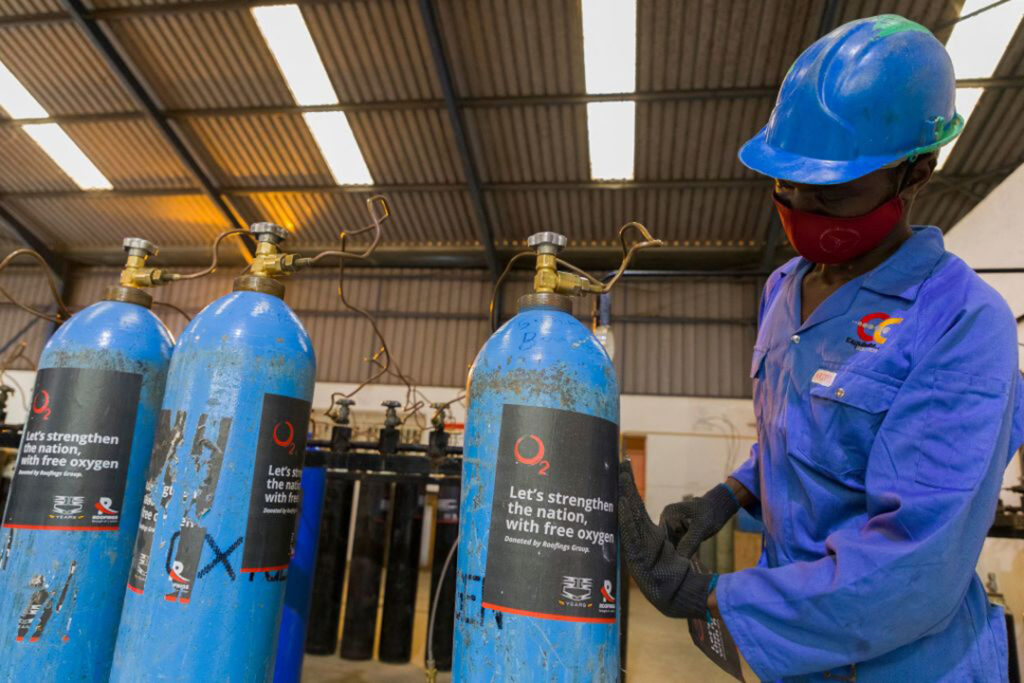ADF STAFF
With the end of the year approaching, African nations are bracing for a new round of COVID-19 infections that public health leaders hope will be less intense than previous waves.
“We seem to have gone down very quickly and stabilized,” Dr. John Nkengasong, director of the Africa Centres for Disease Control and Prevention (Africa CDC),said recently. “Now, my fear is that we should be very careful and not be complacent.”
Across the continent, countries are reporting a drop in cases after the deadly third wave of infections led by the delta variant peaked midyear. Since then, new cases and deaths have declined steadily. New cases dropped 20% in September and another 11% in October, according to Africa CDC.
Experience shows that a continental fourth wave is likely to occur in late December or early January. Nine countries, ranging geographically from Algeria to Benin to Mauritius, are experiencing a rising fourth wave. That number grew with the recent addition of Burkina Faso.
So far, health officials expect the fourth wave to be less intense than the third, which was driven by the delta variant and accounted for about a third of the continental death toll since the start of the pandemic.
While laboratories have identified several new variants, none has taken hold in the way that the beta and delta variants did. Public health experts are watching closely the so-called delta plus variant, also known as AY.4.2, which is driving the latest wave of infections in Europe and could find its way to Africa.
As they prepare for the fourth wave, some health systems are relying on lessons they learned from the third wave. One of those lessons: Increase the medical oxygen supply.
“Building oxygen capacity and treatment facilities during the third wave, we saw that help us immensely,” said Fortunate Bhembe, deputy director of pharmaceutical services at Eswatini’s Ministry of Health.
Since COVID-19 first arrived in Africa in early 2020, the continent has recorded more than 8.5 million cases and more than 200,000 deaths.
Africa’s reported death toll is just 4% of the 5 million reported worldwide after less than two years of the pandemic. However, studies by the World Health Organization (WHO) and demographers suggest COVID-19’s impact on the continent is actually much higher.
A study by the WHO Africa regional office estimates that testing programs catch about 14% of infections — meaning six of every seven cases are going undetected, contributing to the continuing spread of the disease.
A review of data in South Africa, which has the continent’s most thorough accounting of deaths, estimates the actual toll from COVID-19 is triple the official report. If extended continentwide, that would put Africa’s actual pandemic death toll closer to 660,000.
All these factors weigh on the minds of Africa’s public health leaders.
“It’s very unlikely that South Africa will reach a position of herd immunity before the fourth wave,” Dr. Harsha Somaroo told South Africa’s eNews Channel Africa.
The Africa CDC and WHO Africa regional office have begun widespread rapid testing at the community level to detect COVID-19 outbreaks before they can grow into larger infection waves. The tests are simple to use, easy to transport and quick, producing results in about 15 minutes.
People can reduce the threat of the fourth wave by relying on nonpharmaceutical interventions, such as using masks and avoiding large groups, say some experts.
“If we continue with social distancing, we will still get a fourth wave, but it will be mild,” Nicholas Crisp, the deputy director general of South Africa’s Department of Health, told South Africa’s Business Tech. “It could be a quarter of the first wave – minimal.”

